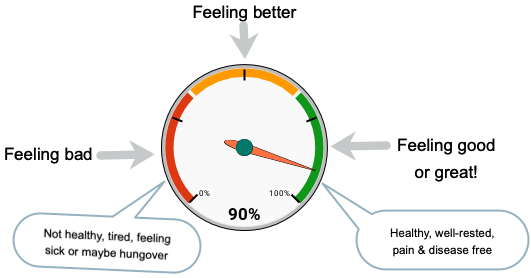Feeling good vs feeling happy
I wish I could feel like this every day. This is a thought I sometimes have. If I were to describe this feeling, it's that of excitement and glowing energy. Everyone would want it if you could get it in a prescription. But getting into this mind-state doesn't involve doing anything extra-special, no adrenaline-fueled activities needed. I wasn't skydiving or lounging on a beach in the Maldives somewhere. I was walking to Tesco the last time I thought to myself, I'm feeling really good.
The cause wasn't the anticipation of doing my weekly shopping. The recipe for this feel-good state is the right balance of exercise, enough sleep and healthy eating. It was on my way to Tesco that got me thinking: am I feeling good or am I feeling happy? What's the difference? The terms are used interchangeably but it feels like they are different. If you're wondering, what's the point of distinguishing the two? I'll get to that.
What is feeling good?
Some of you might think there's no difference between feeling good and feeling happy, however, the clues are in our language. The opposite of feeling good is feeling bad, or by maybe saying "I don't feel good" and feeling this way can be construed as being unwell. Feeling good seems to originate from a physical state: free of disease, pain and being well-rested.
Feeling happy
Feeling happy on the other hand appears to originate from a mental state. Genetically, some of us are naturally happier than others. The author and endocrinologist, Robert Lustig spends a lot of his book "Hacking of the American mind" comparing happiness and pleasure. According to Lustig, while pleasure is short-lived and sometimes obtained from substances, happiness is long-lived, often obtained in social settings.
“Pleasure is short lived, happiness is long lived; pleasure is visceral, happiness is ethereal; pleasure is taking, happiness is giving; pleasure can be achieved with substances, happiness cannot be achieved with substances; and, finally, pleasure is experienced alone, happiness is usually experienced in social groups.” -- Hacking of the American Mind (Robert Lustig)
The opposite of feeling happy is feeling sad or being depressed. And one word that summarises happiness and Lustig uses this a lot, is: contentment.
Feeling good is more achievable
Now we get to the point of the matter. The reason it's worth separating feeling good from feeling happy is because: feeling good is easier and within our control, whereas, feeling happy is less straightforward, it's fuzzy, hard to define and time-consuming. It's a very simple formula to feel good:
The value of diet, exercise and rest will impact your feel-good score. My diet is usually healthy, I enjoy exercise but sleep can be an Achilles heel. If I'm eating well and exercising but not getting enough sleep, I'll feel terrible. Likewise, if I sleep well but eat poorly and don't exercise, then I'll feel average at best.
diet: while I don't want to make this post about what to eat, the topic of diet has become unnecessarily complex when it is not. Eat plenty of vegetables and fruit, reduce processed food and sugar. The bad news is, alcohol impacts how good you feel. From my perspective, I don't abstain but reduce to social occasions that are worthwhile.
exercise: get out and do something that gets your heart pumping. Personally, when I go to the gym, followed by a swim and a sauna then my feel-good score borders euphoria. Each to their own though.
rest: speaking from experience, I know getting enough sleep can sometimes be tricky. I don't want to wake up and be wide awake in the middle of the night for no reason! I've not been tempted with sleeping pills but I find melatonin supplements really help without side-effects. (Melatonin is a natural hormone produced in the brain that's used to regulate sleep.)
stress: avoiding stress is easier said than done. Some people are wired for it more than others. I am not. Exercise is a great remedy for stress, so is reducing media consumption and meditation can help to a degree. But if there's a big stressor in your life, like a job or a partner then change is probably the best remedy. Nothing's worth feeling bad for.
Overriding emotions
Based on the idea that feeling good and feeling happy are different emotions, this poses the question: can you feel happy while not feeling good and can you feel good while being unhappy? I think it depends. It's certainly possible to be unhealthy or even terminally ill and be happy, although your genes would play a role.
Anecdotally, I know someone who's extremely overweight does no exercise, drinks heavily and smokes. In addition, a lot of things have gone against him in life but he's rich in friends and appears to be happy, or at least sounds happy, but I'd argue he doesn't feel good. So this is a case of feeling happy but not feeling good. However, if you're overwhelmingly unhappy or sick then it's a tough battle for any emotion to overcome. An example of this would be: you're incredibly happy but I come along and chop off your small finger, now you're experiencing incredible pain. Your happiness has disappeared. A single strong emotion is all-consuming.
Many studies show that exercise alleviates depression when compared versus a non-exercising control group. However, it's more effective for those with mild or moderate depression. I'd argue that the exercisers are starting to feel good which overrides their unhappy state. Therefore, having below average happiness because of circumstances or genetics can be overridden with a more dominant feeling of good.
The self-help industry
The global self-help industry is worth billions. A book search on Amazon for "happiness" returns more than 60,000 results. And sales are booming "Stressed Brits buy record number of self-help books". The evangelical-Emporer of self-help is Tony Robbins with book titles that include "Unlimited Power" and "Unleash the Power Within". I experienced a live Tony Robbins event (many years ago), where he preached the benefits of material wealth and god and it ended with us all doing a barefoot "fire walk".
Most of the self-help industry is about finding happiness, this could be because of its elusive and fuzzy nature which makes it conducive to hundreds of pages being written in chart-topping books and expensive seminars that involve walking on hot coals and karate-chopping wood to "unleash the power within". A better self-help remedy would be to centre on feeling good, unfortunately for the "gurus", this antidote wouldn't fill two pages in a book or five minutes in a seminar.
Wrapping up
Because of genetics, some people are happier and see the positive side of life. There are others who are the polar opposite. I'd put myself somewhere in the middle. Maybe those of us with below-average happiness levels find it easier to maintain healthy eating and exercise routines because there's a bigger neurochemical reward compared to those with higher baseline levels.
I metamorphose into the evangelical Tony Robbins when I preach to my unhealthy friends about the feel-good benefits of exercise and diet but my efforts are usually wasted. I like to think there isn't a genetic and therefore deterministic preventer to people making the simple changes needed for feeling good. I didn't start exercising until I was 30 (after quitting smoking). And in the beginning, my new routine of exercise and no cigarettes felt awful, but it became a habit which I now enjoy. I can't pinpoint how I felt 15 years ago when I was a smoker, non-exerciser and worse-food eater. But there's no way it's as good as I feel today. And unlike happiness, I like to think that feeling good is within arm's reach for everyone that gives it a try.









